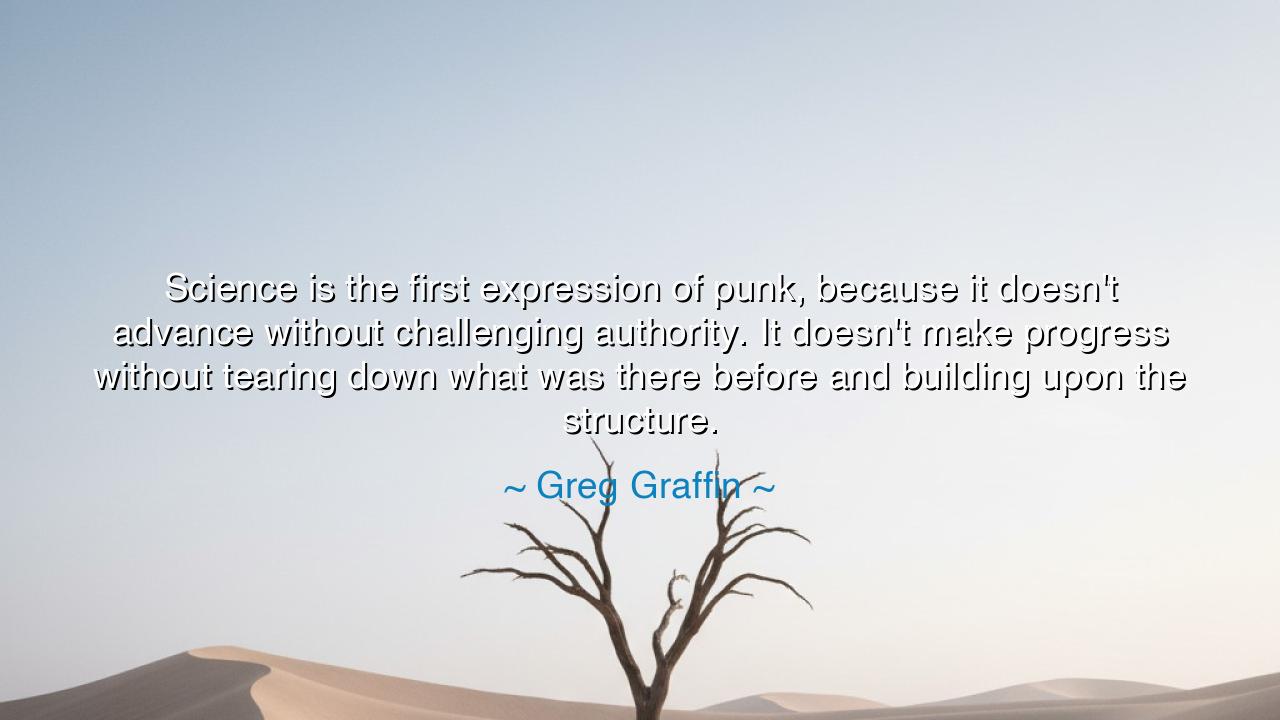
Science is the first expression of punk, because it doesn't
Science is the first expression of punk, because it doesn't advance without challenging authority. It doesn't make progress without tearing down what was there before and building upon the structure.






“Science is the first expression of punk, because it doesn't advance without challenging authority. It doesn't make progress without tearing down what was there before and building upon the structure.” So spoke Greg Graffin, a man who walked both the paths of science and punk music, uniting the laboratory and the stage. His words ring like the clang of a hammer upon iron: bold, rebellious, and yet filled with truth. For what is punk if not defiance? And what is science if not rebellion against ignorance? These two, though born in different worlds, share the same heartbeat—the refusal to bow before unquestioned power, the insistence on carving a new path even when the old road is guarded by kings.
In the ancient days, the mightiest of rulers sought to silence those who questioned the order of the heavens. Priests and emperors declared, “The sun moves because we decree it so.” Yet men like Galileo Galilei, armed only with a telescope and the courage to see, defied their words. He challenged the throne of dogma, saying the Earth itself moved around the sun. For this act of rebellion, he was cast down, silenced, and confined. Yet though they shackled his body, they could not chain the truth. Galileo’s spirit lived on, as a true punk of science, daring to spit in the face of false authority. His struggle carved a new foundation, upon which later generations built the architecture of astronomy.
Thus we understand that science is no gentle servant. It does not bow politely before tradition. It is a warrior with a sharp blade, slicing through the fabric of falsehood. It tears down temples of superstition and rebuilds them with the stone of evidence. It advances only by rebellion, only by standing where others tremble to stand. Just as the punk musician shreds the old order of polished melodies, replacing them with raw, unfiltered chords, the scientist shatters the polished lies of authority and replaces them with truth unrefined, raw, and real.
Look also to Charles Darwin, a quiet naturalist who walked among finches and seashells. His theory of evolution by natural selection was a thunderbolt hurled into the halls of power. It defied the beliefs of church and crown, declaring that life was not static, but rising, struggling, and transforming through the ages. His words were heresy to many, yet his vision became the bedrock upon which modern biology stands. Darwin was not loud, nor was he angry, but within him burned the same rebellious fire that Graffin speaks of. He tore down the old walls of thought, not with guitar strings, but with fossils and feathers, and in their place he built a cathedral of knowledge.
The ancients would tell us: do not confuse rebellion with destruction alone. To destroy without creating is chaos; to destroy and rebuild is wisdom. The true punk spirit of science is not reckless, but purposeful. It dares to question, dares to dismantle, and dares to construct anew, even knowing that the world may curse its name. Authority without reason is tyranny; knowledge without challenge is stagnation. Only in the storm of opposition can truth emerge, shining like lightning across a darkened sky.
And so, O children of tomorrow, learn this: do not bow your head when the guardians of tradition command silence. Ask, inquire, experiment. Challenge not for vanity, but for truth. Let your questions be spears that pierce the armor of false authority. Let your discoveries be the bricks with which you raise a stronger tower of understanding. For to live near science is to live near rebellion, and to live near rebellion is to live near freedom.
Practical is the lesson: cultivate curiosity as one cultivates the soil. Read widely, ask boldly, and never take an answer as final if it rests only on power and not on reason. In your work, in your craft, even in your smallest daily struggles, do not fear to test and to question. Build your life upon evidence, not tradition; upon reason, not blind obedience. This is the legacy of Galileo, of Darwin, of every voice that shouted against silence. This is the legacy of punk. To walk it is not easy, but to walk it is to ensure that the world moves forward, step by step, toward light.






AAdministratorAdministrator
Welcome, honored guests. Please leave a comment, we will respond soon